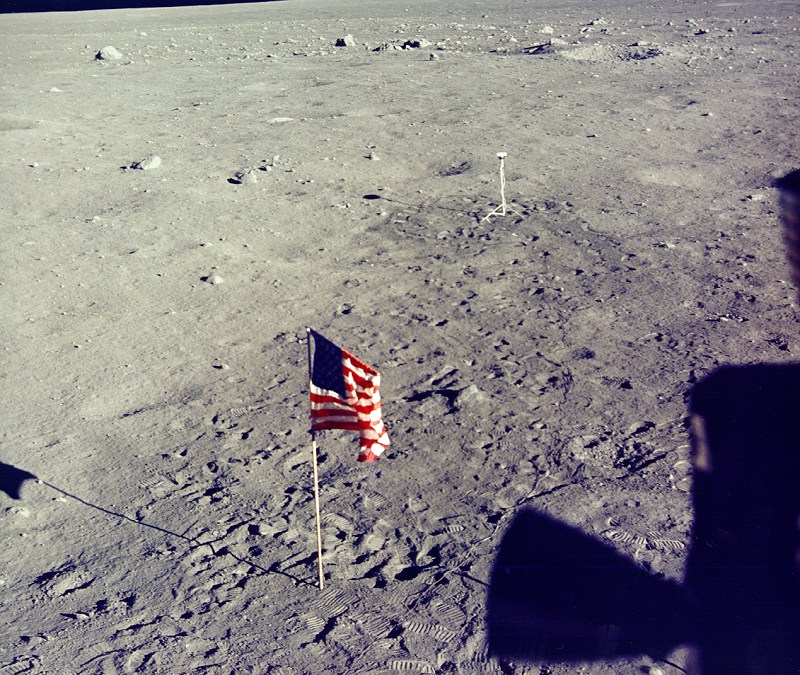A couple of days ago, I walked into a local bookstore near my home and saw a display of books, including astronaut Buzz Aldrin’s new memoir, about the U.S. space program and the first manned landing on the moon. Above it was a large sign in caps: “FOR HISTORY BUFFS.”
I watched the first moon landing at a bar in Paducah, Kentucky, a fact worth mentioning only because I still remember how suddenly silence descended on this raucous place when Neil Armstrong started coming down that ladder. No one spoke, no one moved, people hardly breathed, and nobody ordered a drink or a beer for a long time. In the midst of the horror that was the Vietnam War, here was an event that could inspire some pride in my country again.
I was already writing science fiction, had sold a couple of stories by then, encouraged and pushed into sending them out by my companion and fellow writer George Zebrowski, but they had not yet been published. We had hoped to watch the moon landing together, but George was working in New York City and I was in Kentucky sitting in a bar because my grandparents were celebrating their fiftieth wedding anniversary, and a number of relatives had traveled there to help them celebrate. They had lived long enough to see the history of human-powered flight from the Wright brothers on, and fortunately had another two decades of life ahead of them. My grandfather allowed as how I might even live long enough to see a Mars landing.
I haven’t, of course, except in fiction, including my own, and strongly doubt that I ever will.
Over the years, I have increasingly felt that the world I live in has somehow diverged from the continuum that I lived in then, the one that was to become the spacefaring energy-rich future so many of us foresaw. I’m obviously not alone in this feeling, as something like that mixture of regret and disappointment seems to have fueled the writing of alternative histories, including a few of my own. Humankind’s hopes these days are more limited and more desperate, confined to hoping that we can save our own planet from an ecological catastrophe. Science fiction writers had been imagining that possibility, too, for a number of years before 1969, but such disasters seemed distant back then, a lot further away and more improbable than moon bases, space stations, and a mission to Mars.
Back then, I was unable to predict that I would live long enough to see the dream of traveling to other planets become, not a dreamed-of future realized, but only another part of our past.
Pamela Sargent is a science fiction author, most notably for the popular Venus series. She has also edited numerous collections celebrating science fiction written by women. Her novellette “Danny Goes to Mars” was the winner of the 1992 Nebula Award for Best Novellette.











Pamela – Though I share your despair, I continue to hope. In truth, for me, it goes beyond hope. In my mind, it is a certainty that our race will travel to Mars and other places in the solar system. (We will because those damn science fiction authors keep putting ideas in our heads!). We may not live to see it. But, someday, the burning desire to get there will be united with the means to do it. And then . . . watch out.
Your blog really touched me. I understand that feeling that somehow, we got off on the wrong timeline. That somewhere, that optimism and enthusiasm was lost. Though I know he wasn’t writing about the space program, I think Hunter Thompson had something apropos to say about that spirit of optimism in the 1960’s “We had all the momentum; we were riding the crest of a high and beautiful wave. . . .So now, less than five years later, you can go up on a steep hill in Las Vegas and look West, and with the right kind of eyes you can almost see the high-water mark — that place where the wave finally broke and rolled back.” I’m still waitin’ for the next big wave.
Yes, Zeb. Thinking back to that year has called up a lot of feelings and memories, and that HST piece – powerfully remembered since my first reading of it, not that long after publication – was an important one. It was his birthday last weekend, too.
Coincidentally, someone mentioned “Man of La Mancha” on another topic in the last few days, and I’ve been listening to the music. There’s a similar mood in a lot of the play.
Great commentary, can’t say as I find much to disagree with. Maybe we need another “evil empire” (China?) to scare us into a politically motivated space fervor again – or maybe even the dreaded asteroid encounter – I dunno.
Other than something like that, it could be a number of decades before homo sapiens will be willing or able to resume serious manned explorations.
Thanks for those thoughtful reflections.